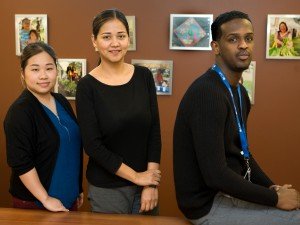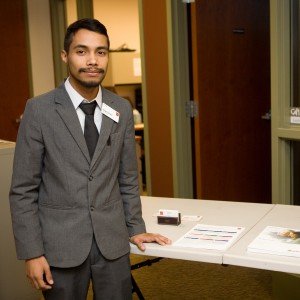By MARGIE O’LOUGHLIN
The letters CAPI stretch across the front of a brick building on the corner of 37th Ave. and E. Lake St., but what do they mean?
CAPI is a small social service agency with a big mission: to meet the diverse needs of new refugees and immigrants from around the world. Started in 1982 as the Center for Asian and Pacific Islanders, the organization was created to assist Hmong refugees coming to Minnesota whose lives had been devastated by the Vietnam War. CAPI’s first initiative was to launch an Asian-specific food shelf in South Minneapolis—the only one of its kind at the time.
This immigrant-led, non- profit organization shortened its name to CAPI in 2008. Its services broadened at that time to meet the needs of newly-arrived East Africans in the wake of the Somali and Ethiopian Civil Wars.
 Photo left: (L to R) Yaomee Xiong, human services manager, Ekta Prakash, executive director, and Abshir Ahmed, employment counselor are part of CAPI’s culturally and linguistically diverse staff. (Photo by Margie O’Loughlin)
Photo left: (L to R) Yaomee Xiong, human services manager, Ekta Prakash, executive director, and Abshir Ahmed, employment counselor are part of CAPI’s culturally and linguistically diverse staff. (Photo by Margie O’Loughlin)
”We serve more than 4,000 clients annually,” said CAPI Executive Director Ekta Prakash. “Our mission is to guide new refugees and immigrants in their journey to self-determination and social equality. We achieve this by focusing on workforce development and job training, as well as access to social services and health care resources.”
CAPI’s 25 person staff is very culturally and linguistically diverse, speaking 15 different languages between them. Prakash noted, “As an immigrant myself, I am proud that we embrace all religions and cultures. Our organization is fully inclusive.”
“There is a lot of fear and chaos in the immigrant and refugee communities right now,” Prakash said. “Many of our clients come from countries affected by the travel ban, and breaking families is not a value that we support at CAPI.”
Employment counselor Abshir Ahmed has deep roots in Minneapolis, which he said, ”has always been a welcoming place for refugees and immigrants.” Born in Somalia, Ahmed and his family fled across the border to Kenya before coming to the United States in 2005. He speaks Somali and Swahili in addition to English and is a graduate of Roosevelt High School.
 Photo right: Jorge Gomez of Wells Fargo Bank was on hand to answer questions from tax clinic participants. Becoming financially literate in a new country is one of the hurdles refugees and immigrants need to overcome. (Photo by Margie O’Loughlin)
Photo right: Jorge Gomez of Wells Fargo Bank was on hand to answer questions from tax clinic participants. Becoming financially literate in a new country is one of the hurdles refugees and immigrants need to overcome. (Photo by Margie O’Loughlin)
“For many of my clients,” Ahmed explained, “language is a still a barrier. Right now, I’m spending a lot of time reaffirming them that they’re here legally—that they can continue down the path they’re on.”
Health and human services manager Yaomee Xiong added, “At CAPI, we work across the generations to care for families in a holistic way. Our immunization program is reducing health disparities among communities of color, with a focus on Somali, Hmong, Lao, and Karen families.
Through our elder care and caregiver support programs, we help older refugees and immigrants by empowering their caregivers.”
CAPI offers many of the resources of a larger organization, but with one notable difference: frequent one-on-one assistance, especially in the areas of job search and resume writing. Community members are needed to volunteer in these capacities, as well as the computer lab, the food shelf (in Sabathani Community Center (318 E. 38th St.), or welcoming clients at the front desk. Email info@capiusa.org to learn more about volunteer opportunities.
As a service to their clients and the community, income tax assistance is available in the CAPI offices on Tuesdays from 5-8pm until May 23. Anyone with an annual household income of less than $55,000 is likely eligible for this free service. Make sure to bring a photo ID, social security card, and W-2 statements. No appointment is necessary, and language translation is available on-site.
Comments
No comments on this item Please log in to comment by clicking here